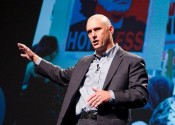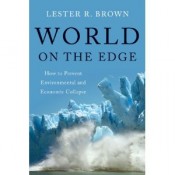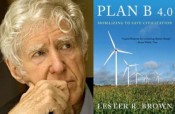Free Forum Q&A – LESTER BROWN, Founder of Worldwatch and Earth Policy Institute author of PLAN B 4.0: Mobilizing to Save Civilization
Written on July 9th, 2015
Originally Aired October 2009
We are in a race between tipping points in natural and political systems.
Which will come first? Can we mobilize the political will to phase out coal-fired power plants before the melting of the Greenland ice sheet becomes irreversible? Can we halt deforestation in the Amazon basin before the forest becomes vulnerable to fire and is destroyed? Can we cut carbon emissions fast enough to save the Himalayan glaciers that feed the major rivers of Asia? Can we win this race?
LESTER BROWN thinks we can…
In his book, PLAN B 4.0: MOBILIZING TO SAVE CIVILIZATION, BROWN lays out the symptoms, the diagnosis, and the cure. He estimates that we could solve all the world’s greatest problems for $200B a year – less than half the US defense budget.
PLAN B 4.0 is a comprehensive plan for reversing the trends that are undermining our future. Its four overriding goals are to stabilize climate, stabilize population, eradicate poverty, and restore the earth’s damaged ecosystems. Failure to reach any one of these goals will likely mean failure to reach the others as well.It’s time for Plan B: an all-out response at wartime speed proportionate to the magnitude of the threats facing civilization.
http://www.earth-policy.org/about_epi/C32
Q&A: Mark Mykleby, Natl Security=Sustainability
Written on April 8th, 2013 |
Aired: 04/07/13
In the preface to an article entitled A National Strategic Narrative, Anne-Marie Slaughter of Princeton says we need a narrative that confronts some of the following questions, “Where is the United States going in the world? How can we get there? What are the guiding stars that will illuminate the path along the way? We need a story with a beginning, middle, and projected happy ending that will transcend our political divisions, orient us as a nation, and give us both a common direction and the confidence and commitment to get to our destination.” She also writes, “In one sentence, the strategic narrative of the United States in the 21st century is that we want to become the strongest competitor and most influential player in a deeply inter-connected global system, which requires that we invest less in defense and more in sustainable prosperity and the tools of effective global engagement.”
Over time, the best way to shape the force of the future is to invest in the science, technology, education, and training that will equip our soldiers, sailors, airmen, and marines to adapt to an increasingly complex and dynamic environment. The hardware and software we buy and build are secondary to the gray matter we must cultivate now.
When I hear that someone high up in the military is talking seriously about sustainability, I take notice.
www.newamerica.net
Q&A: LESTER BROWN, Worldwatch Institute
Written on April 14th, 2011 |
Aired 04/10/11
LESTER BROWN has been described by the Washington Post as "one of the world's most influential thinkers." After working with the Department of Agriculture in international agricultural development, Brown helped establish the Overseas Development Council, then founded the Worldwatch Institute, which plays an important role in the public's understanding of trends in our global environment with its annual State of the World report and Vital Signs. In 2001, he left Worldwatch, founded Earth Policy Institute, and continues his vital work. During a career that began with tomato farming, Brown has been honored with numerous prizes, including the MacArthur "Genius" Fellowship, the United Nations Environment Prize, and Japan's Blue Planet Prize, along with some 20 honorary degrees.
In his new book, WORLD ON THE EDGE: HOW TO PREVENT ENVIRONMENTAL AND ECONOMIC COLLAPSE, BROWN lays out the symptoms, the diagnosis, and the cure, what he calls "Plan B". He estimates that we could solve all the world's greatest problems for $200B a year - less than a third the US defense budget - but it will take an all-out response at wartime speed proportionate to the magnitude of the threats facing civilization.

